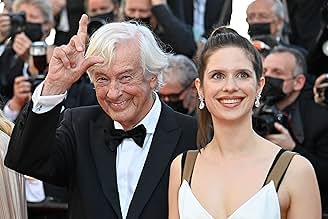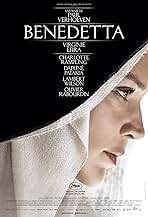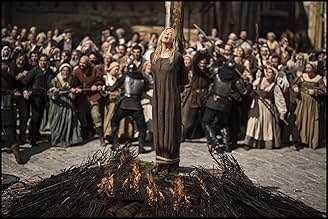Una monja del siglo XVII en Italia sufre perturbadoras visiones religiosas y eróticas. Ella es asistida por una compañera y la relación entre las dos mujeres se convierte en una historia de ... Leer todoUna monja del siglo XVII en Italia sufre perturbadoras visiones religiosas y eróticas. Ella es asistida por una compañera y la relación entre las dos mujeres se convierte en una historia de amor romántica.Una monja del siglo XVII en Italia sufre perturbadoras visiones religiosas y eróticas. Ella es asistida por una compañera y la relación entre las dos mujeres se convierte en una historia de amor romántica.
- Premios
- 3 premios ganados y 21 nominaciones en total
Argumento
¿Sabías que…?
- TriviaProduction ended November 2018, and the film was initially scheduled for release at the Cannes Film Festival in 2019, but in December 2018, director Paul Verhoeven had to undergo surgery for a hip injury suffered due to the set's location, which involved lots of hills and climbing. Post-production in Amsterdam had to be delayed until June 2019 to allow time for him to recover from his surgery. However, subsequent complications from pain medication caused an intestinal obstruction that ended in a life-threatening colon perforation; fortunately, Verhoeven's wife urged him to go to the hospital in time. Verhoeven and producer Saïd Ben Saïd agreed to delay the release to 2020 in order for Verhoeven to recover, and be fully present during the post-production process. Verhoeven still credits his editor Job ter Burg for finishing much of the film on his own while he himself was recovering and unable to attend. Eventually, the world-wide COVID-19 pandemic caused the movie to be delayed for another year.
- ErroresAfter the nuncio has demonstrated the pear of anguish, it is nearly closed again, but when he hands it to the torturer it is suddenly opened.
- Citas
Benedetta: Pride is a sin.
Soeur Jacopa: We're all entitled to a sin. What's yours?
- ConexionesFeatured in Javo & Temoc: Top 10 Películas: Lo "mejor" del año (2022)
Opinión destacada
Some film critics in Greece thought that this movie is a hybrid of parody and satire in its attitude towards organized religion. I disagree. Although the treatment of religious themes is rather blasphemous by pietistic standards the amount of human misery and suffering portrayed does not allow the viewer to conceive the movie as satire at least solely as such. Surely the religious visions and the sexual adventures of Benedetta treat religion irreverently but the consequences for her and her protégé Bartolomea have nothing humorous about them. In that time, unlike ours - at least in the West- no jokes were allowed concerning religion.
Misery, violence, intrigue abound in the plot and lust, although explicit, is just one of the sins portrayed. Ambition, struggle for power and precedence, avarice are the prevailing motives of the characters. Christian charity pales before those demonic passions although it is not totally absent.
The plight of the poor, the intrigues of the powerful, the omnipresence of the plague, the violence of the soldiery offer a bleak picture of society. One is reminded of Flesh and Blood by the same director situated in about the same historical period. Both have a central heroine with superb survival skills to help her navigate through insurmountable adversities.
Humour and satire exist but the general atmosphere is so ominous, so laden with menace, violence and disease that you are left saddened with the misery inherent in the human experience of 17nth century Tuscany. Nothing betrays the artistic splendour of the Renaissance, just a bleak struggle for survival and mastery, for power and precedence, for wealth and prestige where Christianity is used to serve those ulterior motives.
It is a sad movie. That said Virginie Efira and Daphne Patakia are gorgeous both artistically and sexually. But I think Charlotte Rampling in the role of the abbess gives the more memorable performance as a character full of ambiguity and contradictions. Lambert Wilson shines as the satanic nuncio although his character is rather flat in his evil propensities.
The costumes and the representation of the era are superb and the religious visions of Benedetta are far-fetched and subversive. Pietistic believers are going to be offended and will probably say: would he dare to do the same with Muslim religious symbols? But I do not think that the movie is anti-Christian. It shows how lofty ideals are used by flawed humans to further very earthly ambitions.
It is true though that without divine solace the society portrayed by Benedetta would be impossible to live in. Watch the movie and form your own opinion.
Misery, violence, intrigue abound in the plot and lust, although explicit, is just one of the sins portrayed. Ambition, struggle for power and precedence, avarice are the prevailing motives of the characters. Christian charity pales before those demonic passions although it is not totally absent.
The plight of the poor, the intrigues of the powerful, the omnipresence of the plague, the violence of the soldiery offer a bleak picture of society. One is reminded of Flesh and Blood by the same director situated in about the same historical period. Both have a central heroine with superb survival skills to help her navigate through insurmountable adversities.
Humour and satire exist but the general atmosphere is so ominous, so laden with menace, violence and disease that you are left saddened with the misery inherent in the human experience of 17nth century Tuscany. Nothing betrays the artistic splendour of the Renaissance, just a bleak struggle for survival and mastery, for power and precedence, for wealth and prestige where Christianity is used to serve those ulterior motives.
It is a sad movie. That said Virginie Efira and Daphne Patakia are gorgeous both artistically and sexually. But I think Charlotte Rampling in the role of the abbess gives the more memorable performance as a character full of ambiguity and contradictions. Lambert Wilson shines as the satanic nuncio although his character is rather flat in his evil propensities.
The costumes and the representation of the era are superb and the religious visions of Benedetta are far-fetched and subversive. Pietistic believers are going to be offended and will probably say: would he dare to do the same with Muslim religious symbols? But I do not think that the movie is anti-Christian. It shows how lofty ideals are used by flawed humans to further very earthly ambitions.
It is true though that without divine solace the society portrayed by Benedetta would be impossible to live in. Watch the movie and form your own opinion.
- georgioskarpouzas
- 18 nov 2021
- Enlace permanente
Selecciones populares
Inicia sesión para calificar y agrega a la lista de videos para obtener recomendaciones personalizadas
- How long is Benedetta?Con tecnología de Alexa
Detalles
- Fecha de lanzamiento
- Países de origen
- Sitios oficiales
- Idiomas
- También se conoce como
- Blessed Virgin
- Locaciones de filmación
- abbaye cistercienne, Le Thoronet, Var, Francia(convent interiors)
- Productoras
- Ver más créditos de la compañía en IMDbPro
Taquilla
- Presupuesto
- USD 24,350,000 (estimado)
- Total en EE. UU. y Canadá
- USD 354,481
- Fin de semana de estreno en EE. UU. y Canadá
- USD 136,839
- 5 dic 2021
- Total a nivel mundial
- USD 4,265,353
- Tiempo de ejecución2 horas 11 minutos
- Color
- Mezcla de sonido
- Relación de aspecto
- 2.39 : 1
Contribuir a esta página
Sugiere una edición o agrega el contenido que falta

Principales brechas de datos
What is the streaming release date of Benedetta (2021) in India?
Responda































